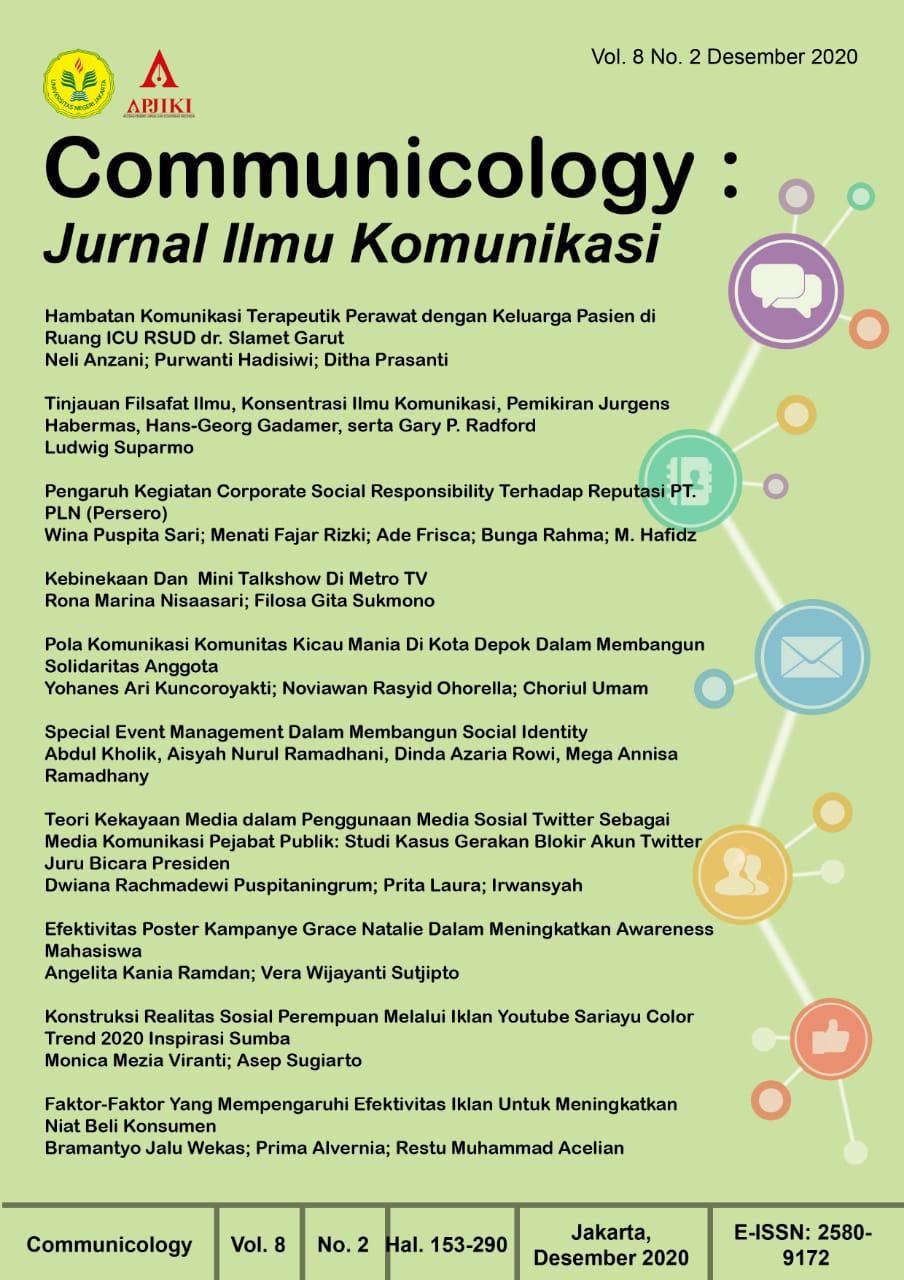Tinjauan Filsafat Ilmu, Konsentrasi Ilmu Komunikasi, Pemikiran Jurgens Habermas, Hans-Georg Gadamer, serta Gary P. Radford
DOI:
https://doi.org/10.21009/COMMUNICOLOGY.020.02Keywords:
communication transmission concept – language as reality – main philosophical thinking – the three societal importances – theory of communication actions – speaking about communication – the world will look as it isAbstract
Abstract
This write-up is a literature study on Philosophical Sciences in view of Communications Study. Studying philosophy is a never ending effort. The communication philosophy refers to the ethics theories and guidelines. The most profound of these is the formulation of the dialogic coordinates, a standard set of prerequisite communication elements necessary for inciting dialogue. A short study of three prominent philosophers’, i.e.: Jürgen Habermas, Hans Georg-Gadamer and Gary P. Radford are discussed here as examples to encourage scientific class discussionns.
References
Arneson.P. (2007). Perspective on Philosophy of Communication. Purdue University Press, West Lafayete, Indiana
Bertens, K. (1975). Ringkasan Sejarah Filsafat, Kanisius, Yogyakarta
Georg-Gadamer, Hans. (2013). Truth & Method, Bloomsbury Academic; Amazon.com
Littlejohn, S.W; Foss, K.A.. (2008). Theories of Human Communication. Thomson Wadsworth, Belmont, USA
Miller, K. (2005). Communication Theories. McGraw Hill, Boston
Radford, Gary P. (2005). On The Philosophy of Communication, Thomson Wadsworth,
Australia, Canada, Mexico, Singapore, Spain, UK, USA
Soetriono; Hanafi, Rita. (2007). Filsafat Ilmu dan Metodologi Penelitian. Andi, Yogyakarta
Suriasumantri, Jujun S. (2017). Filsafat Imu, Sebuah Pengantar Popuker. Pustaka Sinar Harapan, Jakarta
Syafiie, Inu Kencana. (2007). Pengantar Filsafat, Refika Aditama, Bandung
Vardiansyah, Dani. (2008). Filsafat Ilmu Komunikasi Suatu Pengantar. Indeks, Jakarta
Zubaedi. (2007). Filsafat Barat, Ar-Ruzz, Jogyakarta
Downloads
Published
How to Cite
Issue
Section
License
Authors who publish with this Journal agree to the following terms:
- Author retain copyright and grant the journal right of first publication with the work simultaneously licensed under a creative commons attribution licensethat allow others to share the work within an acknowledgement of the work’s authorship and initial publication of this journal.
- Authors are able to enter into separate, additional contractual arrangementfor the non-exclusive distribution of the journal’s published version of the work (e.g. acknowledgement of its initial publication in this journal).
- Authors are permitted and encouraged to post their work online(e.g. in institutional repositories or on their websites) prior to and during the submission process, as it can lead to productive exchanges, as well as earlier and greater citation of published works.
Users/public use of this website will be licensed to CC BY





